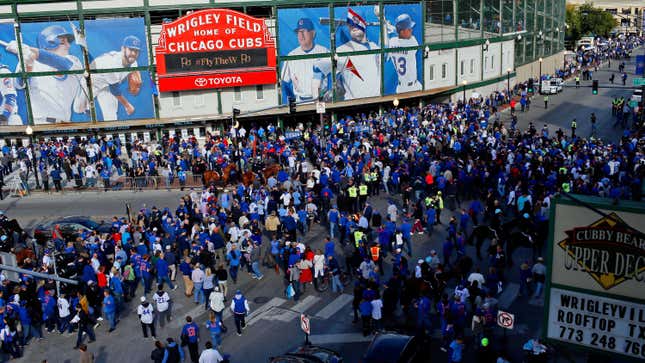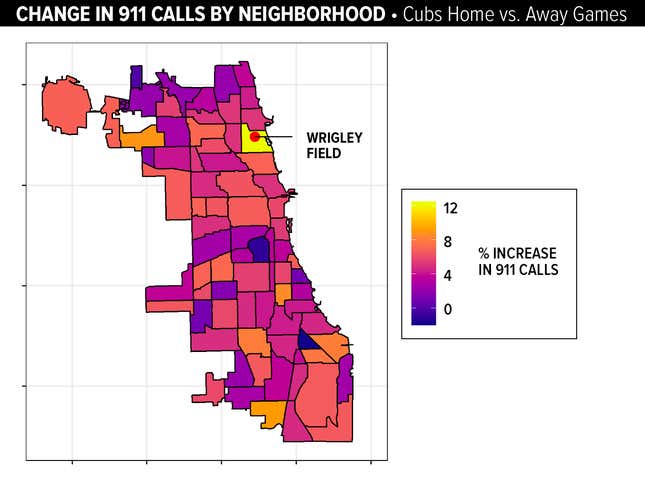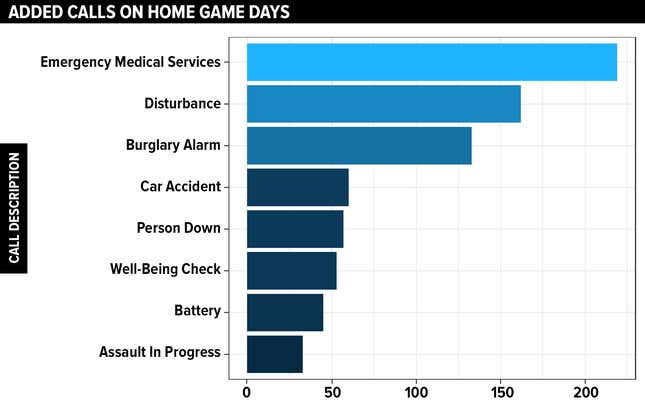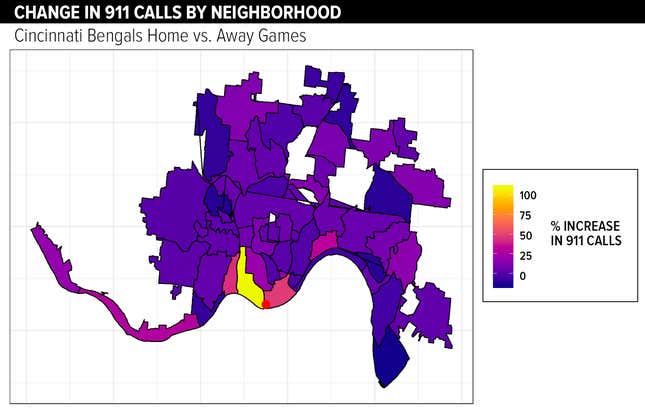
The internet is full of anecdotal evidence that a professional sporting event is a great place to witness reckless, rowdy, and even violent behavior. But do they really present more dangers than can be found in any major American city on any given night? That’s what we aim to find out.
Because YouTube videos showing inebriated fans punching each other are no substitute for hard data, we had to come up with another way to discover if and which major sporting events tend to bring an uptick in requests for emergency services. To start with, we gathered public data on the number of 911 calls made in 11 of the biggest U.S. cities over the last few years. This includes incidents that might never prompt a police report, like car accidents or assaults where no one was injured—the type of small emergency common on game day, and often dispersed by police without filing any charges. Then we looked to see if there was an increase in calls on nights or days when a city hosted an NFL, MLB, NHL, or NBA game. (Unfortunately, we could only find 11 major cities that make their 911 call data readily available.)
For every city and team combination, we averaged the number of 911 calls made when the team plays at home compared to their road games. (Because crime tends to go up in the summer and down in the winter, comparing home to away games was better than home games to the rest of the year.) In total, we collected information on millions of emergencies for 32 different fanbases in each of the four major sports. And what did we find?

This chart shows the average daily effect of each team on its city’s emergency dials. Each dot is one combination of a city and its team. Points further to the right indicate that the team adds 911 calls to the city when they’re at home; when they are left of zero, the team’s home games coincide with a drop in 911 calls in the city at large. The bigger blue dots show the average effect of each sport.
Hockey, a sport that sanctions on-ice fighting, and football, the American pastime that celebrates brain damage, may be significantly more violent within the games, but apparently that doesn’t translate to the fans. Outside of the Bengals, the two sports that drive the most 911 calls are basketball and baseball.
Chicago Cubs home games coincide with the biggest increase in the raw number of emergencies of any city/sport combination. The area around Wrigley Field is a hotbed of drinking, debauchery, and public urination. And if we zoom in on a map of Chicago’s extra 911 calls, it’s clear that many of the additional emergencies are in the area around Wrigley.

Each neighborhood is color-coded by the percentage increase in 911 calls on days of Cubs home games. Most of the more than two hundred additional emergencies fall within the neighborhoods around Wrigley.

But the Cubs have a leg up by playing in America’s third-largest city. On a percentage basis, the undisputed kings of game-day emergencies are certainly the Cincinnati Bengals. When the Who Dey play, emergency calls in the normally-quiet downtown districts of the Queen City spike an astounding 50-100 percent while the rest of the city is unperturbed. That includes dozens of drug stops, plenty of disorderly conduct, and even 32 cases of assault.
As is the case with the Cubs, drilling down on where the additional calls are coming from reveals that the biggest spike by far comes from the neighborhood where the Bengals’ stadium is located.

The Reds cause no such mayhem, so this has less to do with Cincinnati generally and more with the Bengals specifically. Maybe they’re taking the pain of rooting for a perpetually losing but never-changing outfit out on each other. Maybe they’re inspired by a roster that regularly hosts criminals. Maybe they’re mad that Marvin Lewis was the head coach for so long. Whatever the reasoning, Bengals home games increase the number of 911 calls in Cincinnati by 10 percent across the entire city. That makes the three percent boost Chicago gets from the Cubs look like child’s play.
Though the Bengals and Cubs lead the metaphorical pack, honorable mentions belong to the Chicago Bears, Seattle Seahawks, and Brooklyn Nets, each of which adds around 30 emergency calls per home game to their respective cities.
By contrast, 14 teams seem to reduce 911 dials on the days of their home games. The Blackhawks, for example, pull down emergency calls by more than 100 per day. It could be due to increased security around a stadium located in a sometimes-dangerous area, or perhaps pulling all those unruly hockey fans off the streets gives them fewer opportunities to commit crimes.
Surprisingly, there was no connection between the outcome of the game and whether the fans got into more trouble afterwards. Close wins and losses provoked just as many emergencies as blowouts. Fans apparently don’t take their disappointment out on the city after a loss, or maybe their enthusiasm for crime is just blunted by sadness.
These are only the franchises and cities for which we could get data. Other fanbases with even more reckless behavior could lurk in one of the many cities that don’t make 911 call information readily available. Phillies fans, for example—famed for throwing batteries and other drunken antics—couldn’t be measured because Philadelphia doesn’t post 911 call data. Similarly, there was no day-to-day data on rowdy 49ers fans, who frequently start brawls in the stands of their home stadium. However, when the 49ers moved from Candlestick Park to Santa Clara in 2014, police reports in the small city as a whole increased by 2,000—15 percent!—from year to year. (They have since dropped but remain well above 2013 levels.)
Maybe one of these teams—or an unexpected dark horse like the Vancouver Canucks—is the true champion of game day criminal behavior. Whatever fanbase is worst, one thing is certain: stay out of Wrigleyville.